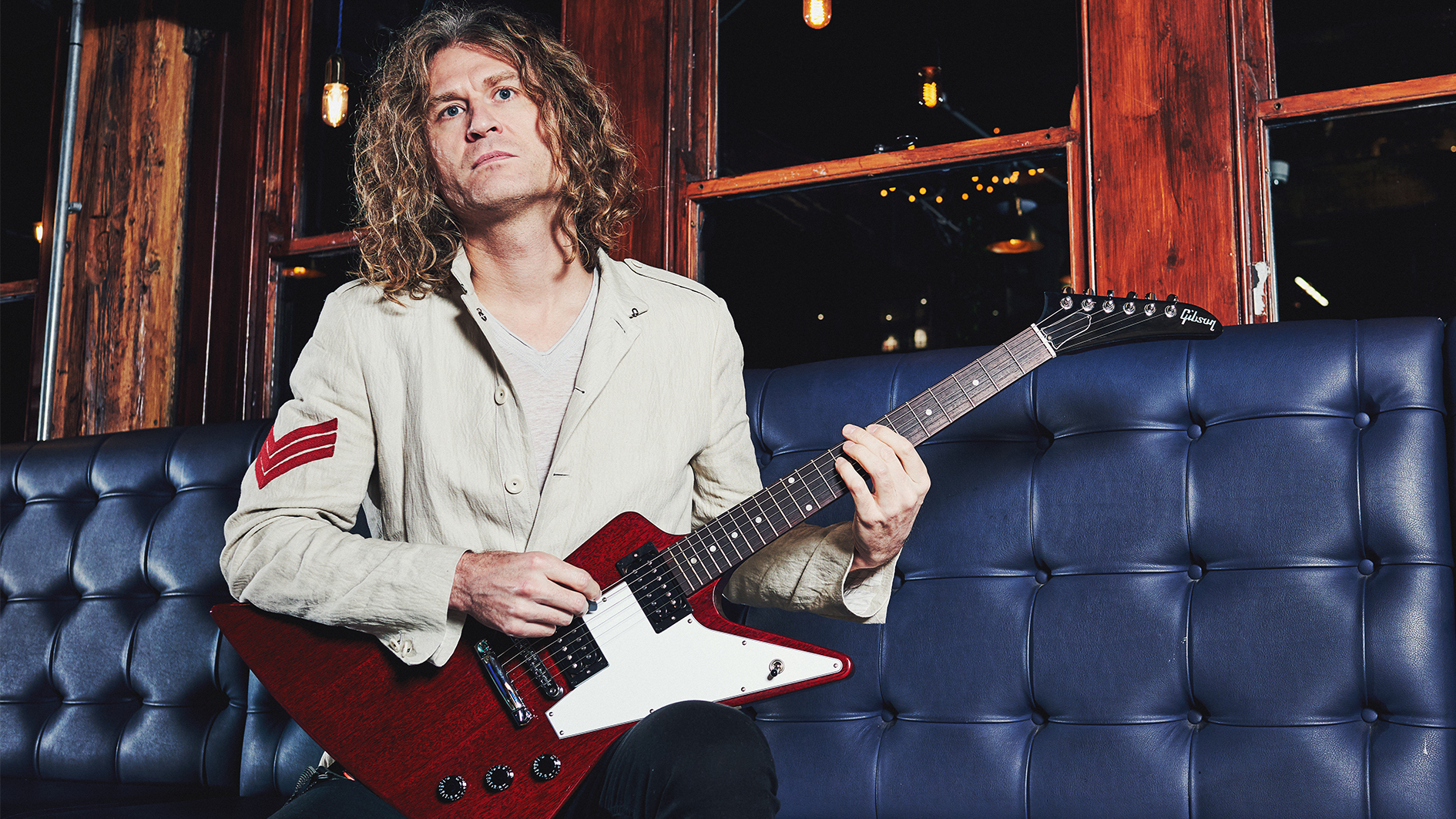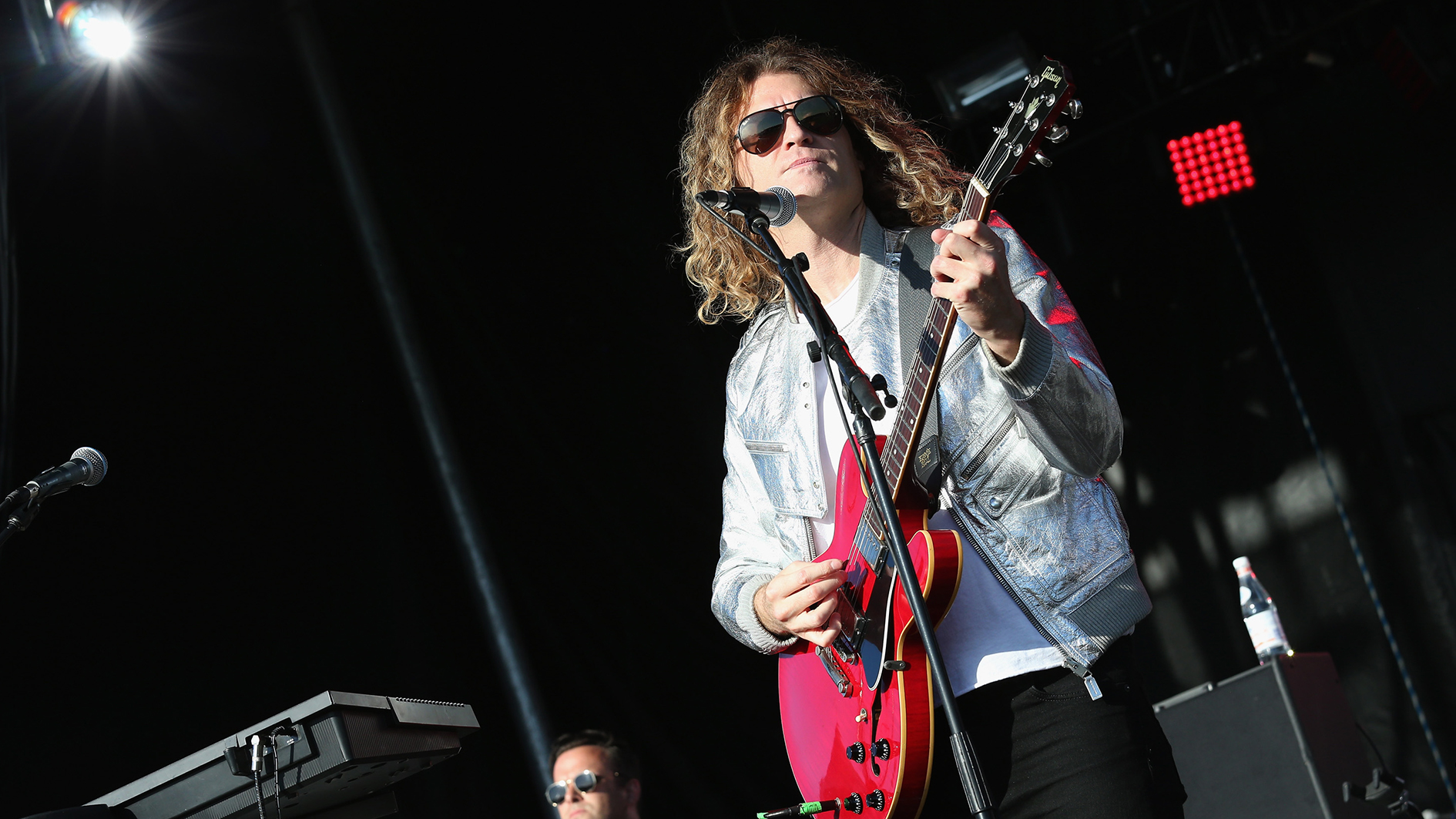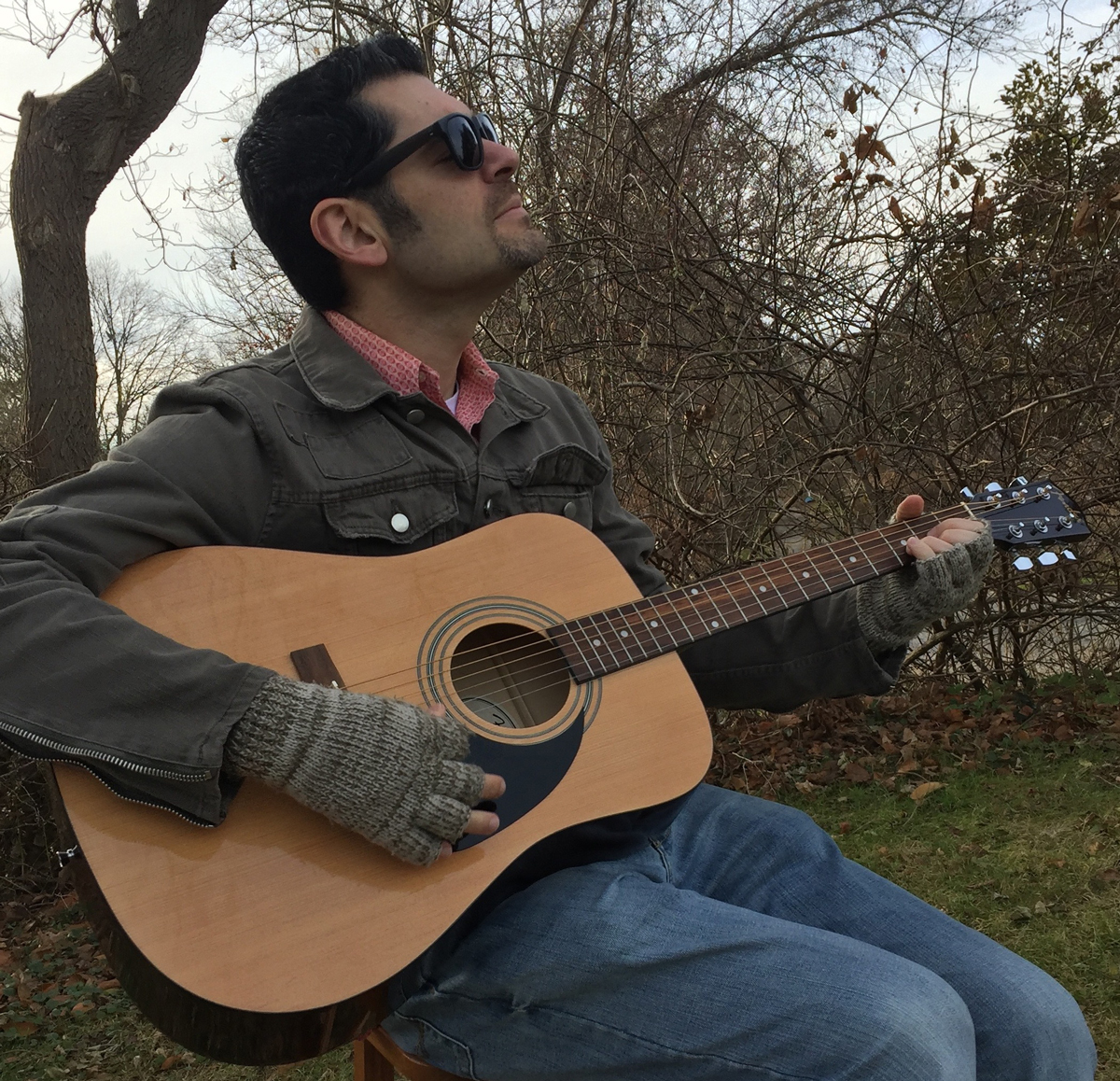Dave Keuning: “The second I get a pedal, I write a song with it right then and there, because it’s some fun, new sound that inspires me”
The Killers guitarist explains why he took a break from the indie-rock giants, how he ended up returning to record Pressure Machine, and his most recent solo album, A Mild Case of Everything

When it became known in 2017 that the Killers’ guitarist, Dave Keuning, was to take a sabbatical from recording and touring with the band, some fans figured they had seen the last of one of the group’s co-founders in its ranks.
But upon the arrival of the band's seventh studio album, Pressure Machine, in August 2021, Keuning was back in the band full-time – and a few months earlier, had even issued a sophomore solo studio effort, A Mild Case of Everything.
Keuning spoke to Guitar World shortly after the arrival of Pressure Machine to discuss what brought him back into the fold, and the gear he used for the album's sessions.
How did you approach Pressure Machine from a guitar perspective?
“I approached it the way I approach a lot of stuff from the Killers or my own stuff – which is each song is its own thing. I don’t usually take the whole album as an approach. But each song was a case-by-case basis – even though there is kind of a theme throughout the album.
“There’s maybe a little more slide guitar than any other Killers album. I just did a lot of experimenting on each song, and kept what was good.”
You’re listed as a co-writer of two songs on the album, In the Car Outside and the title track.
Get The Pick Newsletter
All the latest guitar news, interviews, lessons, reviews, deals and more, direct to your inbox!
“Brandon always has a handful of songs that he’s got a head-start on – he’s writing them at home, chord changes, the lyrics, and all that. So, those would be the songs that we would come in and all try and piece together – together – and finish, and add drums, bass. We had a little time where I came in and we got to start playing and see what came out of us.
“I don’t think either of those ideas was something I planned ahead of time. They’re probably chord changes I had played before – because I have quite a few that I have a habit of playing at home, and tend to go in that direction.
We’re open-minded to try anything at the beginning. And then when we get to the studio, we start filtering out what we don’t like
“But I just came in and I was testing all my pedals out, and I was testing out my Synth9 pedal by Electro-Harmonix. I was playing that chord change, and he liked it and started singing over it. That’s how a lot of Killers songs are born.
“[The song] Pressure Machine, I really like that one. That was one [where] I was on acoustic, and kind of the same process – I was playing acoustic in the room, he started singing scratch vocal lyrics, and it came about pretty nicely.
“There was a bridge I had for it that we never needed. And that melody, he came up with right on the spot. So, nice and natural on that one.”
As far as the songwriting in the Killers, when Brandon brings a song in, does he let you play whatever you want? Or does he offer suggestions?
“He pretty much lets me play whatever I want. When it comes time to the studio, then we start analyzing stuff, and, ‘Oh, there’s this bit,’ or sometimes just adding a new part is fresh and fun – and it adds something.
“But initially, he doesn’t say, ‘Please do this’ or ‘Don’t do this.’ We’re open-minded to try anything at the beginning. And then when we get to the studio, we start filtering out what we don’t like.”
You also played pedal steel on the album – on the song Runaway Horses.
“I like slide guitar – it’s not something I do. To me, it’s like a different instrument I get to play – it’s fun for me. I don’t remember if I used a lap steel on the album, even though I am probably better at the lap steel than I am on the pedal steel. The pedal steel is a little bit of a different beast.
“We did several takes and took parts of that. I don’t think it was my pedal steel – it was already set up in the room. That’s usually how recordings go – or really, just how life goes in general: whatever is in front of you just gets done. So, it was there and played on that.
“I actually had practiced a little bit the years before, here and there. I really should practice more. It’s one of those things where I can do it good enough. I can jam along to Hank Williams songs and figure out some of that stuff.
“When it’s straight across on the pedal steel, then it’s a lot easier than it sounds. Changing chords is something that takes a little time to do naturally – you can figure the part out ahead of time and then record it.
Usually, the second I get a pedal, I write a song with it right then and there, because it’s some fun, new sound that inspires me
“But I have a lot of respect for these country guys who are playing all these parts and changing chords on the fly. Because that takes some getting used to.”
What was your guitar setup on the album?
“I brought a few things to Sound City, and there was no point – they had everything. They had so many guitars and basses and pedals and amplifiers. I always bring a few of my favorite things, but they had so much to pick from that I felt like a fool for bringing anything.
“I’m sure I used a few Telecasters, I used my Yamaha Revstar on a few songs, we used a mandolin on a few songs – and they had a lot of acoustics to pick from. 12-string acoustics – that all got in there. I mentioned that Synth9 pedal, and there was a Third Man [and Gamechanger Audio] pedal – the Plasma pedal. That was the secret to my Cody solo, which I think turned out kind of cool.
“I had just gotten that pedal… usually, the second I get a pedal, I write a song with it right then and there, because it’s some fun, new sound that inspires me. Or in that case, I had just bought that pedal and said, ‘Can I try this on that solo?’ And the guys liked it.
“It’s a really cool, distorted pedal that kind of breaks up in a way that’s hard to emulate and it’s kind of unique in that pedal.”

What about amps?
“I’m still using my Fender Hot Rod DeVille as much as I can. That’s kind of my go-to amp, so I’m sure I used that on a few things.
“I know we did some of the pedal steel through a Fender Twin Reverb, because I just felt like, ‘A pedal steel through that, you can’t go wrong.’ That is one of the best clean sounds you can get.
“I’m trying to remember what I did on my Roland Jazz Chorus – because that is also arguably the best clean sound you can get. But it’s a little more ‘shinier’ sounding.
“Also, a Fender Princeton – that’s my other favorite for clean sounds. I’m sure I used all three of those on there.”
You also released a solo album this year, A Mild Case of Everything.
I was just at home, recording on a four-track cassette recorder – kind of like how I used to do in college, and early Killers days, too
“I had a lot of leftover songs I worked on during Covid and I got a chance to work on them a little bit. A few of them were actually spawned by going back to a four-track recorder with a cassette, because I usually have an engineer come over if I’m making demos. I can run Pro Tools, but I’m not that great.
“So, Covid in the beginning, everyone was like, super, super-scared. There was a period where no one was leaving their house, because they didn’t know just how bad it was – if it was some horror movie that was going to take us all over.
“I was just at home, recording on a four-track cassette recorder – kind of like how I used to do in college, and early Killers days, too. That was fun – I made 11 songs from there, and I think at least three or four came from that. From Stardust came from that, On the Ground came from that.
“So, when there came time to get a couple of producers out, we just took two weeks to finish vocals on everything, add some guitars, and do all the things that I don’t do very well alone in a studio.
“I’m really happy with how it turned out. I got to finish a lot of my ideas. I have complete control over certain ideas that I get to do whatever I want with. And that’s nice to do – no matter what your band situation is, it’s just nice to do it.”
Why did you take a break from the Killers a few years back?
“A lot of reasons. It’s a long list of very small reasons. But I will say that most musicians that have been in other bands that have toured the world, they don’t need to ask me this question – because a lot of them don’t want to tour anymore!
“It’s exhausting – especially if you have children or family back home. But even if you don’t have children or family back home, you’re never home… or you’re barely home and then you’re planning to leave again. I was burnt out from traveling more than anything.
“I for sure would have done it if it was like the Star Trek era, and we could just transport to the show and transport back to my bedroom. I really miss playing the shows, but the other 22 hours of the day, you basically spend on a car ride back to the hotel, or you’re in a bus or an airplane, staring out the window, reading a book, or watching something. I would often just stare out the window and just dream of being home.
“Because 80% of the time, you’re not home. A little more balance would have been nice. Because when we start touring, it’s usually full-on, and they have a way of taking your days off from you – because there will be some opportunity you can’t turn down, that you must do on your week off. And then all of a sudden, your days off are gone, too.
We’re trying to write stuff for the next Killers record already. I’m happy to be back
“It was not an easy thing to do. It was a very, very hard decision. I don’t know if I regret it, honestly. I did miss playing shows, but I have my own issues with my own health – literally, my health and my mental health of, ‘Can I handle this?’
“I don’t regret not touring for that time. I felt like I didn’t have a choice.”
What made you decide to return?
“Covid happened, and those guys were set to tour again. It was kind of a weird time for us, because we weren’t sure what we were all going to do. They were going to tour and then that was cancelled.
“Then they decided to make another record, which was kind of the perfect opportunity to start fresh. So, we contacted each other and started talking again. And I was like, ‘I’ll come in from the beginning of this record, and we’ll see where it goes.’
“And now, I’m back playing shows again. We’re also trying to write stuff for the next Killers record already, as well. I’m happy to be back.
“People are always asking me, ‘What’s in store next?’ So far, so good. I don’t know how to answer that. I don’t think I know the answers, but I am enjoying playing the shows with the guys again – and that’s a good sign.
“So, I think when things get real crazy, there are moments where I can barely handle it. Like, when you’re gone 300 days a year. That’s a bit much.”
Is there a certain thing you’ve found that is able to balance your personal life with your professional life?
“Oh yeah, I found the perfect thing to balance it – Covid! Because we’re still not out of the woods, and things are being cancelled still. So, the schedule is not that hard right now. But we’ll see how things go.
“Like I said, I missed playing the shows, so even if things go back to normal, I would like to experience that again – life back to normal and concerts back to normal. We’ll just see what happens.”
- The Killers' Pressure Machine and Dave Keuning's A Mild Case of Everything are both out now.
Greg is a contributing writer at Guitar World. He has written for other outlets over the years, and has been lucky to interview some of his favorite all-time guitarists and bassists: Tony Iommi, Ace Frehley, Adrian Belew, Andy Summers, East Bay Ray, Billy Corgan, Alex Lifeson, Geddy Lee, Les Claypool, and Mike Watt, among others (and even took lessons from John Petrucci back in the summer of ’91!). He is the author of such books as Grunge Is Dead: The Oral History of Seattle Rock Music, Shredders: The Oral History of Speed Guitar (And More) and Touched by Magic: The Tommy Bolin Story.
“This particular way of concluding Bohemian Rhapsody will be hard to beat!” Brian May with Benson Boone, Green Day with the Go-Gos, and Lady Gaga rocking a Suhr – Coachella’s first weekend delivered the guitar goods
“I was writing songs from eight years old, but once I got a guitar I began to deeply identify with music… building an arsenal of influences”: How Lea Thomas uses guitars her dad built to conjure a magic synthesis of folk, pop and the ethereal











